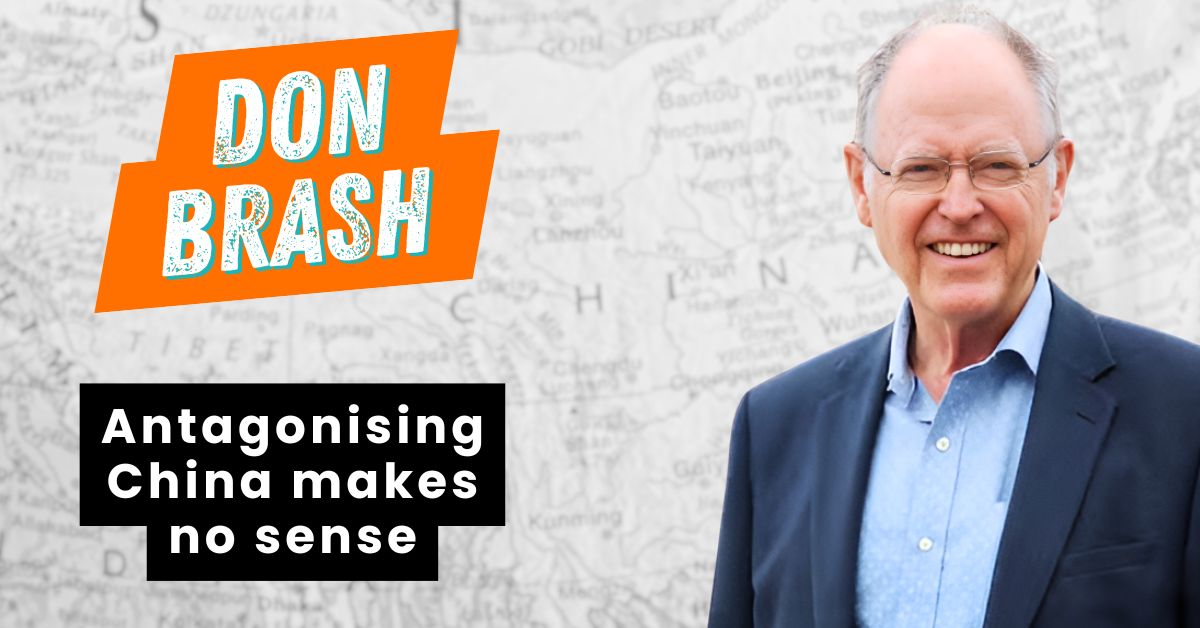
by Don Brash
Having listened to my discussion on foreign policy with Sean Plunket on 10 June, I feel the need to clarify my position.
Let me start by saying that I have a high regard for Sean Plunket. He has long been a voice of reason on New Zealand’s airwaves, and in recent years, with the support of the Wright family and a number of other very talented interviewers, he has been successful in getting the Platform to the point where it is now compulsory listening for all those who wish to be well informed.
But on foreign policy he has a blind spot.
He sees the world as an existential struggle between democracy, represented by the United States, and autocracy, represented by China; a struggle between the good guys in white hats and the bad guys in black hats. And he therefore sees it as self-evident that New Zealand should not only remain close to the US but should help the US in its opposition to China.
But this view of the world is entirely too simplistic. If world affairs are best seen as a struggle between democracy and autocracy, how come this isn’t reflected in the foreign policy of the US itself?
How come the US can threaten Canada and Mexico (two democracies) with high tariffs, and in the case of Canada with annexation?
How come the US can impose tariffs on exports from New Zealand despite our having almost no tariffs on imports from the US?
How come President Trump can withdraw military support from democratic Ukraine and urge them to accept autocratic Russia’s terms for a ceasefire?
How come the first countries President Trump visited in his second term were autocratic Saudi Arabia and the United Arab Emirates?
How come the US is apparently trying to improve its relationship with Vietnam, a country which is not only autocratic but also communist?
Sean reminded me and his listeners during the interview that it is not so many years ago that the US sent tens of thousands of its young men to push back on Imperial Japan. I wasn’t quick enough to point out that the US entered the Second World War only after it was itself attacked, and more than two years after Nazi Germany had conquered most of continental Europe and come close to invading the United Kingdom.
I admire much about the United States – I lived there for five years, was the CEO of an investment bank partly owned by an American bank for more than 10 years, and have visited there many times on business and on vacation. But I’m not naïve: US foreign policy is primarily for the benefit of the US, unsurprisingly.
As I mentioned briefly during my interview with Sean, US foreign policy is best understood as the behaviour of a dominant Power pushing back against a rising Power.
Harvard historian Graham Allison best described this reality in his book “Destined for war: Can America and China escape Thucydides’s trap?”, published in 2017 shortly after the start of President Trump’s first term.
In that book, he looked back over the last 500 years and found 16 examples of where a dominant Power was challenged by a rising Power. In 12 of those 16, war was the result – in other words, war is not the inevitable result of a rising Power challenging an established Power, but it is a very possible outcome, perhaps even a probable outcome.
The US has clearly been the dominant Power since 1945, challenged by the Soviet Union for the next four decades – with near-calamitous results on several occasions. Then unchallenged until the last decade or so and the rise of China.
It is surely no surprise that the US now feels threatened by China, a country which has seen quite phenomenal economic and military growth over the last three decades in particular. At market exchange rates, the Chinese economy remains somewhat smaller than the American, but at purchasing-power-parity exchange rates, more meaningful when comparing economic size, the Chinese economy is already larger than the American by a significant margin. Although the Chinese economy is growing much more slowly than it did a decade or so ago, it is still growing faster than the US economy, which suggests that its relative size will continue to grow. It is already the largest trading partner with the great majority of countries, including New Zealand of course.
Were there to be a nuclear war between the US and China, there would be no winners in any meaningful sense: China’s stockpile of nuclear weapons is understood to be vastly smaller than that of the US, but it is still large enough to inflict enormous damage on the US mainland.
But a war which did not go nuclear? The outcome is by no means certain. America would be fighting a long way from its industrial base and, looking at the two most substantial wars that the US has been involved in during my adult lifetime – Vietnam and Afghanistan – it is not at all clear that the US would, in any meaningful sense, win a conventional war.
So what is the optimal foreign policy for New Zealand? Without doubt it is to do all in our power to maintain a cordial relationship with both the US and with China. In the Pacific “jungle”, they are both seriously large elephants. There is absolutely no evidence that either country seeks to invade New Zealand so it is entirely unclear why we have any interest in antagonizing either country.
